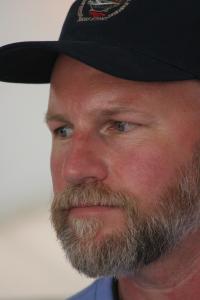Deb and Ron Shrader

The Working Waterfront Festival Community Documentation Project
This project documents the history and culture of the commercial fishing industry and other port trades. The project began in 2004 in conjunction with the Working Waterfront Festival, an annual, educational celebration of commercial fishing culture which takes place in New Bedford, MA. Interviewees have included a wide range of individuals connected to the commercial fishing industry and/or other aspects of the port through work or familial ties. While the majority of interviewees are from the port of New Bedford, the project has also documented numerous individuals from other ports around the country. Folklorist and Festival Director Laura Orleans and Community Scholar and Associate Director Kirsten Bendiksen are project leaders. The original recordings reside at the National Council for the Traditional Arts in Maryland with listening copies housed at the Festival's New Bedford office.
Janice Fleuriel
Erin Heacock
On September 26, 2004, Millie Rahn interviewed Deb and Ron Schrader as part of the Working Waterfront Festival Community Documentation Project. Ron was raised in a fishing family, and knew he wanted to be a fisherman from an early age, and made his way along the coast from North Carolina to New Bedford, MA, where he achieved his goal of becoming a captain. Deb grew up in New Bedford, but it wasn’t until she met Ron that she became involved in the local fishing industry. Her growing interest in the fishing community inspired her to become a paralegal, using these skills to found Shore Support, a fishermen's advocacy organization, with the goal to give fishermen a voice in the regulatory process. Deb shares further details about her work, including her work to dismantle the Magnuson Act and the Sustainable Fisheries Act, noting that many other sources of pollution and environmental factors that affect fish populations were ignored in favor of placing most of the blame on the fishing industry. Both acknowledge the importance of collaboration between scientists and fishermen to create accurate and sustainable regulations, with Ron saying, “If they’re going to create the rules, they gotta have good data for conservation measures, for the fish, for the people, everyone’s gotta come out of this okay, not just the fish or the people. Fishermen don’t want it to be in a situation where we’re depleting the resource…We’re working with these people, and they’re working with us.”
Please Note: The oral histories in this collection are protected by copyright and have been created for educational, research and personal use as described by the Fair Use Doctrine in the U.S. Copyright law. Please reach out Voices@noaa.gov to let us know how these interviews are being used in your research, project, exhibit, etc. The Voices staff can help provide other useful resources related to your inquiry.
The NOAA mission is to understand and predict changes in climate, weather, oceans, and coasts, to share that knowledge and information with others, and to conserve and manage coastal and marine ecosystems and resources. The Voices Oral History Archives offers public access to a wide range of accounts, including historical materials that are products of their particular times, and may contain offensive language or negative stereotypes.
Voices Oral History Archives does not verify the accuracy of materials submitted to us. The opinions expressed in the interviews are those of the interviewee only. The interviews here have been made available to the public only after the interviewer has confirmed that they have obtained consent.
